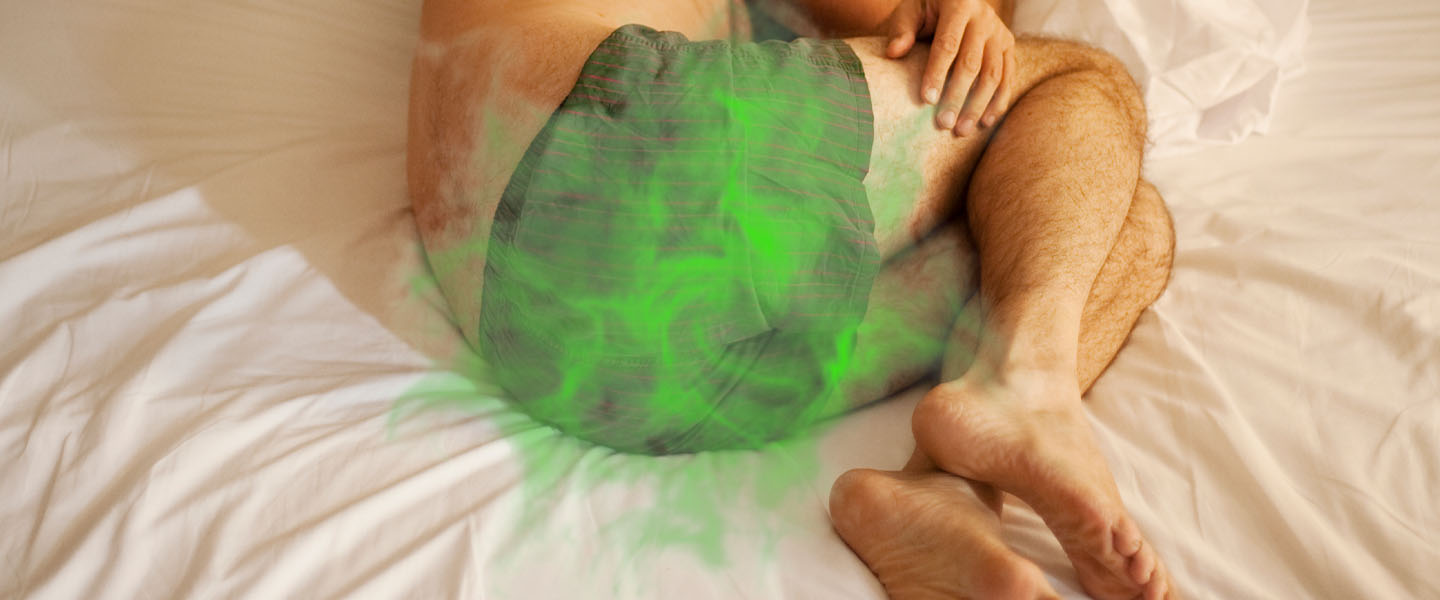

FAQs
Why Do We Fart In Your Sleep
Modified: August 5, 2023
Discover the reasons behind farting in your sleep and find answers to your general questions about this bodily function.
(Many of the links in this article redirect to a specific reviewed product. Your purchase of these products through affiliate links helps to generate commission for Under-tec.com, at no extra cost. Learn more)
Table of Contents
Introduction
Have you ever woken up to an embarrassing noise that escaped from your backside while you were fast asleep? Don’t worry, you’re not alone. Farting in your sleep is a common occurrence that affects many people. While it may seem like an awkward topic to discuss, understanding the science behind why we fart in our sleep can help shed light on this natural bodily function.
Farting, also known as flatulence, is the result of gas being released from the digestive system. This can happen when we’re awake, but it can also occur during sleep. Although we may not be conscious of it, our bodies continue to digest food and produce gas even while we’re in dreamland.
The act of farting can be caused by various factors, including the foods we eat, the air we swallow, and the bacteria in our guts. It’s important to note that farting is a normal and healthy bodily function. In fact, the average person farts between 5 and 15 times a day.
While farting may be embarrassing or socially awkward, it serves an essential purpose in our bodies. The release of gas helps to relieve pressure in the digestive system and prevents bloating and discomfort. So, rather than being embarrassed by it, we should embrace the fact that farting is a natural part of being human.
Throughout this article, we will delve deeper into the science behind farting in your sleep, explore the factors that contribute to it, discuss the different types of gas released, highlight any potential health implications, and provide some tips on managing and preventing farting during sleep. So, let’s dive in and uncover the mysteries of sleep farting.
The Science Behind Farting
Understanding the science behind farting is key to unraveling why it occurs during sleep. When we consume food, it travels through our digestive system, where it is broken down and absorbed. During this process, gases such as nitrogen, oxygen, carbon dioxide, hydrogen, and methane are produced.
These gases can build up and create pressure in the digestive system. When the pressure becomes too high, the body releases the excess gas through the rectum in the form of a fart. The release of gas helps to alleviate discomfort and prevent damage to the digestive organs.
While this process occurs during the day when we’re awake, it doesn’t stop when we fall asleep. Our digestive system continues to function, albeit at a slower pace, while we’re in a restful slumber. The gas that accumulates overnight can lead to farting during sleep.
It’s worth noting that the frequency of farting in your sleep can vary. Factors such as diet, overall health, and individual body chemistry can influence how often you pass gas while catching those Z’s. Additionally, certain conditions, such as irritable bowel syndrome (IBS) or lactose intolerance, can contribute to increased farting both during the day and at night.
Another factor to consider is sleep position. Certain sleeping positions, such as lying on your back, can contribute to the release of gas during sleep. This is because lying on your back can put pressure on your digestive system, making it easier for gas to escape.
Ultimately, the science behind farting is a complex but natural process. It’s the result of the digestive system doing its job and releasing trapped gas to maintain balance and comfort. So, the next time you let one rip in your sleep, remember that it’s simply your body’s way of keeping things running smoothly.
Factors that Contribute to Farting in Sleep
Farting in your sleep can be caused by a variety of factors, ranging from dietary choices to underlying health conditions. Understanding these factors can help provide insights into why some people may experience more frequent bouts of flatulence during slumber.
1. Diet: What you eat plays a significant role in the production of gas in the digestive system. Foods that are high in fiber, such as beans, lentils, and certain vegetables, are notorious for causing gas. Additionally, consuming dairy products or foods that contain artificial sweeteners can also contribute to increased farting during sleep.
2. Swallowing Air: When you eat or drink, it’s common to swallow small amounts of air. This air can get trapped in the digestive system, leading to increased gas production and farting. Factors that can contribute to swallowing air include eating too quickly, chewing gum, drinking carbonated beverages, or smoking.
3. Gut Bacteria: The bacteria in your gut play a crucial role in digestion. However, some types of bacteria produce more gas than others. Imbalances in gut bacteria, such as an overgrowth of certain strains, can contribute to excessive flatulence, even during sleep.
4. Sleep Position: As mentioned earlier, your sleep position can impact the frequency of farting during sleep. Lying on your back can put pressure on the digestive system, making it easier for gas to escape. Conversely, sleeping on your side or in a fetal position can help minimize the occurrence of sleep farts.
5. Underlying Health Conditions: Certain medical conditions can contribute to increased farting, both during the day and at night. Conditions such as irritable bowel syndrome (IBS), lactose intolerance, and gastrointestinal infections can cause excessive gas production and result in more frequent farting during sleep.
It’s important to note that while farting in your sleep can be embarrassing, it’s generally not a cause for concern. However, if you experience persistent and severe gas or have other digestive symptoms, it may be advisable to consult a healthcare professional to rule out any underlying health issues.
By understanding the factors that contribute to farting in sleep, you can make informed choices about your diet, lifestyle, and sleep position to help manage and reduce nighttime flatulence.
Types of Gas Released During Sleep Farting
When it comes to farting in your sleep, different types of gases are released, each with its own distinct odor and composition. Understanding these gases can provide insights into why some farts have a stronger smell than others.
1. Nitrogen (N2): Nitrogen is the most abundant gas in the Earth’s atmosphere, and it makes up a significant portion of the gas released during farting. While it is odorless and doesn’t contribute to the unpleasant smell of farts, it does make up the majority of the gas volume.
2. Oxygen (O2): Like nitrogen, oxygen is an odorless gas that is also present in farts. However, its percentage is typically lower compared to nitrogen. Oxygen itself does not contribute significantly to the smell of farts.
3. Carbon Dioxide (CO2): Carbon dioxide is a natural byproduct of digestion and is released during the breakdown of carbohydrates in the digestive system. It is responsible for the bubbles that form and make fart sounds. While it doesn’t have a strong odor, an excess amount of carbon dioxide can contribute to bloating and discomfort.
4. Hydrogen (H2): Hydrogen gas is produced by certain types of bacteria in the gut as they break down carbohydrates that are not fully digested. While hydrogen itself is odorless, it can react with other gases and compounds in the digestive system to produce foul-smelling sulfur compounds, contributing to the notorious smell of farts.
5. Methane (CH4): Methane gas is produced by a type of bacteria known as methanogens in the gut. It accounts for the distinct smell of some farts. The presence of methane can vary between individuals, depending on their gut flora and dietary habits. Foods high in fiber, such as beans, lentils, and certain vegetables, can promote the production of methane gas.
While these are the main types of gases released during farting, there can be other trace gases and compounds present as well. Various factors, including diet, gut health, and individual differences, can influence the composition and smell of the gases released during sleep farting.
It’s important to remember that while farting may not always smell pleasant, it is a natural and necessary bodily function. However, if you notice a significant change in the smell or frequency of your farts, it could be a sign of an underlying health issue. In such cases, it is recommended to consult a healthcare professional for further evaluation and guidance.
Health Implications of Farting in Your Sleep
While farting in your sleep is typically harmless and normal, there are some health implications to consider. Understanding these implications can help you determine if there are any underlying issues that need to be addressed.
1. Digestive Health: Farting is a natural process that helps to relieve pressure and discomfort in the digestive system. However, excessive farting, especially during sleep, can sometimes indicate underlying digestive issues. Conditions such as irritable bowel syndrome (IBS), food intolerances, or gastrointestinal infections may contribute to increased gas production and require medical attention.
2. Diet and Nutrition: The foods you consume can significantly impact the amount of gas produced in your digestive system. A diet high in certain types of carbohydrates, such as fiber-rich foods, can increase gas production and lead to more frequent farting. It’s essential to maintain a well-balanced diet and identify any foods that might trigger excessive farting or digestive discomfort.
3. Sleep Disturbances: Frequent farting during sleep can disrupt your sleep quality and lead to a restless night. The noise and odor associated with farting can cause discomfort and potentially wake you up or disturb your partner’s sleep. If this becomes a recurring issue affecting your sleep, it may be beneficial to assess your diet and lifestyle habits to minimize gas production.
4. Psychological Impact: For some individuals, farting during sleep can be emotionally distressing or create feelings of embarrassment. It’s important to remember that farting is a normal bodily function and should not be a source of shame. If the psychological impact is severe, it may be helpful to seek support from a healthcare professional or counselor to address any underlying self-esteem or body image concerns.
In most cases, farting in your sleep is a natural occurrence and not a cause for significant concern. However, if you experience persistent digestive symptoms, such as abdominal pain, bloating, or changes in bowel habits, it is advisable to consult with a healthcare professional. They can evaluate your symptoms, provide appropriate diagnostic tests if necessary, and recommend dietary or lifestyle changes to help manage any underlying conditions.
Remember, maintaining a healthy lifestyle, including a balanced diet, regular exercise, and stress management, is crucial for optimal digestive health and overall well-being.
Managing and Preventing Farting in Sleep
Farting in your sleep can sometimes be inconvenient or embarrassing, especially if it affects your sleep quality or disturbs your partner. While it may not be possible to completely prevent farting during sleep, there are some strategies you can try to manage and minimize its occurrence.
1. Diet Modifications: Pay attention to your diet and identify any foods that tend to make you gassier. Common culprits include beans, lentils, cruciferous vegetables, dairy products, and carbonated beverages. Consider reducing or avoiding these foods, especially in the evening, to help decrease gas production during sleep.
2. Eat Smaller Meals: Consuming large meals can put additional stress on your digestive system, leading to increased gas production. Opt for smaller, more frequent meals to ease the digestive process and minimize gas buildup during sleep. Additionally, eating slowly and chewing your food thoroughly can help prevent swallowing excess air.
3. Be Mindful of Air Swallowing: Avoid habits that contribute to swallowing excess air, such as chewing gum, using straws, or drinking carbonated beverages. These activities can introduce additional gas into your digestive system, leading to increased farting during sleep. Stick to drinking from a glass and take small sips to minimize air ingestion.
4. Sleep Position: Experiment with different sleep positions to find the one that is most comfortable for you and decreases the likelihood of farting during sleep. Sleeping on your side or in a fetal position can help reduce pressure on your digestive system and make it less likely for gas to escape.
5. Probiotics: Consider incorporating probiotics into your daily routine. Probiotics are beneficial bacteria that can help restore the balance of your gut flora and improve digestion. They can potentially reduce excessive gas production and farting both during the day and at night. Consult with a healthcare professional to determine which probiotic supplement may be suitable for you.
6. Stress Management: Stress can affect digestion and contribute to increased gas production. Engaging in stress-reducing activities such as exercise, meditation, or deep breathing exercises before bed can help promote relaxation and support healthy digestion.
7. Seek Medical Advice: If you experience persistent or severe symptoms, such as excessive farting, abdominal pain, bloating, or changes in bowel habits, it’s important to consult with a healthcare professional. They can evaluate your symptoms, rule out any underlying medical conditions, and provide personalized recommendations to manage and address your specific concerns.
It’s worth noting that farting is a normal bodily function, and occasional flatulence during sleep is generally harmless. However, if you find that it significantly affects your sleep quality, causes discomfort, or is indicative of an underlying health issue, it’s important to seek professional guidance for proper diagnosis and management.
Conclusion
Farting in your sleep may be a natural and inevitable part of being human, but it can sometimes be a source of embarrassment or discomfort. Understanding the science behind farting, the factors that contribute to it, and the different types of gases released during sleep can help demystify this bodily function.
While it may not be possible to completely prevent farting during sleep, there are ways to manage and minimize its occurrence. Modifying your diet, being mindful of air swallowing habits, practicing stress management techniques, and considering probiotic supplements can all contribute to reducing excessive gas production and farting during sleep.
It’s important to remember that farting is generally a harmless bodily function. However, persistent and severe symptoms, such as excessive farting, abdominal pain, or changes in bowel habits, may be indicative of underlying health issues. If you have concerns, it’s always advisable to consult with a healthcare professional for an accurate diagnosis and appropriate management.
So, the next time you’re startled awake by a mid-sleep toot, remember that farting in your sleep is a normal and natural occurrence. Embrace the fact that our bodies are designed to release gas to maintain comfort and balance within our digestive system. Accepting and understanding this essential bodily function can help us navigate sleep farting with confidence and ease.










